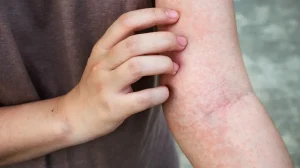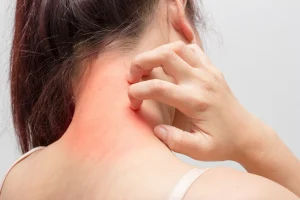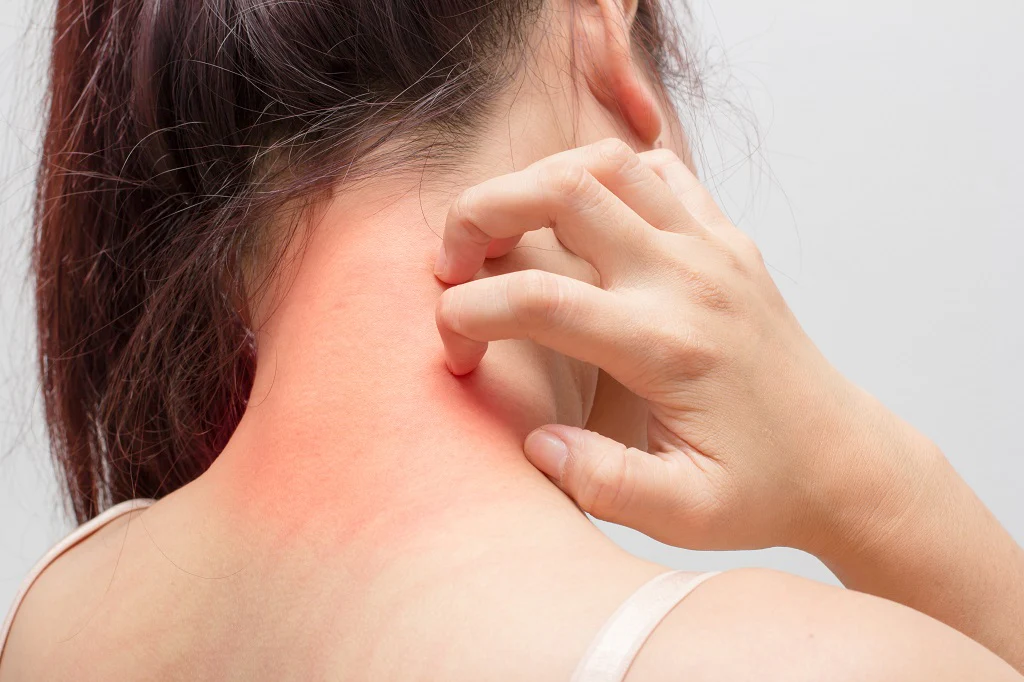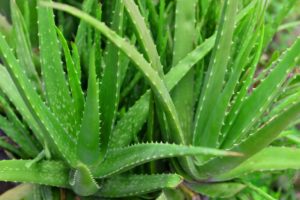
Itching is a common symptom experienced by many dengue patients, typically occurring during the recovery phase.
The primary cause of itching in dengue is related to the body’s immune response. As the infection subsides, the immune system releases histamines and other chemicals, leading to skin irritation and itching. Additionally, as the platelet count recovers, the skin undergoes healing, which can also contribute to itching sensations. In some cases, the use of certain medications, like antibiotics or pain relievers, may trigger allergic reactions that cause or worsen itching. Another factor could be dehydration, as dengue often leads to fluid loss, making the skin dry and prone to irritation.
For treatment, antihistamines such as cetirizine or loratadine are commonly recommended to control allergic reactions and reduce itching. If the itching is severe, doctors may prescribe mild corticosteroid creams to provide relief. Keeping the body hydrated is crucial, as proper hydration supports skin healing and prevents excessive dryness. Patients should avoid scratching, as it can lead to secondary infections, further complicating recovery. Wearing loose and comfortable clothing made of soft fabrics like cotton can help minimize skin irritation.
Several home remedies can be effective in managing dengue-related itching. Applying coconut oil or aloe vera gel can provide a soothing effect and reduce inflammation. Neem leaves, known for their antibacterial and anti-inflammatory properties, can be boiled in water and used as a bath soak to relieve itching. A paste made from sandalwood powder and rose water can also help cool the skin and reduce irritation. Oatmeal baths are another natural remedy that can calm itching and nourish the skin. Consuming vitamin C-rich foods like oranges, lemons, and papayas can boost immunity and speed up skin recovery. Additionally, turmeric mixed with honey or milk has anti-inflammatory and healing properties that may help in soothing the skin. Avoiding spicy and oily foods during the recovery phase is advisable, as these can trigger more heat in the body and worsen itching. By following these remedies and medical treatments, dengue-related itching can be effectively managed, ensuring a smoother and more comfortable recovery process.
Itching is a frequently reported symptom during the recovery phase of dengue fever, often occurring as the body begins to heal. This condition, also known as post-dengue itching, can be distressing and uncomfortable for patients. The primary cause of itching is the immune system’s reaction to the virus, which triggers the release of histamines and inflammatory substances that affect the skin. Additionally, as the body repairs itself and blood circulation improves, toxins and cellular debris are cleared from the system, sometimes leading to irritation and itching. Another reason for itching in dengue is the regrowth and regeneration of skin cells, especially if a rash was present during the illness. The dengue rash, which often appears during the febrile phase, may start to fade and peel off, contributing to a sensation of itchiness. Moreover, some patients may develop an allergic reaction to medications taken during the course of dengue treatment, further worsening itching.
The severity of itching varies from person to person, with some experiencing mild discomfort and others facing intense irritation that disturbs sleep and daily activities. To manage this condition, doctors often recommend antihistamines such as cetirizine, loratadine, or fexofenadine to control allergic responses and reduce inflammation. In severe cases, topical corticosteroid creams or calamine lotion may be prescribed to provide relief. Since dry skin can worsen itching, applying gentle moisturizers, preferably those containing aloe vera, shea butter, or glycerin, can help soothe irritation. Drinking plenty of fluids, including coconut water, herbal teas, and fruit juices, ensures proper hydration, which is essential for skin health and recovery. Patients are advised to avoid scratching the affected areas, as this can cause small wounds or infections, prolonging the healing process.
Home remedies play a significant role in managing dengue-related itching. Applying neem leaf paste or neem oil to the affected areas can provide relief due to its antibacterial and anti-inflammatory properties. Cold compresses or ice packs wrapped in a soft cloth can temporarily reduce itching and inflammation. A bath with oatmeal, baking soda, or apple cider vinegar is another effective remedy for soothing irritated skin. Aloe vera gel, known for its cooling and healing properties, can be directly applied to itchy areas to reduce discomfort. Honey, mixed with turmeric, is a natural remedy that not only soothes itching but also aids in overall skin healing. Consuming herbal teas like chamomile, peppermint, or green tea can help detoxify the body and reduce inflammatory responses. Papaya leaves, often used to boost platelet count, may also contribute to skin recovery when consumed in juice form.
A balanced diet also plays a crucial role in minimizing itching and speeding up dengue recovery. Foods rich in antioxidants, such as citrus fruits, berries, and green leafy vegetables, help reduce inflammation and support skin regeneration. Omega-3 fatty acids found in flaxseeds, walnuts, and fish may further reduce inflammation and promote healthy skin. Avoiding processed foods, excessive sugar, and caffeine can prevent worsening of itching and allow the body to heal naturally. Since heat can aggravate itching, staying in a cool and well-ventilated environment is beneficial. Wearing loose-fitting cotton clothes and using mild, fragrance-free soaps can prevent further irritation. By combining medical treatments with natural remedies and lifestyle adjustments, patients can effectively manage post-dengue itching and recover more comfortably.



 DailyMediCure
DailyMediCure 









